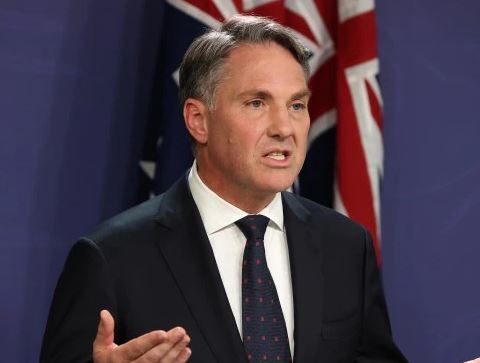New Delhi: Australia backs India’s fight against terrorism, and it considers ties with New Delhi crucial for Canberra’s national interest, Australian Deputy Prime Minister Richard Marles said Wednesday.
During talks with Defence Minister Rajnath Singh, Marles welcomed the cessation of military actions between India and Pakistan, and described it as “an act of Indian leadership”.
In the meeting, India and Australia agreed to expand their strategic cooperation for peace and stability in the Indo-Pacific.
The Pahalgam terror attack and Pakistan’s support to cross-border terrorism figured in the Singh-Marles talks.
In his remarks, Singh hailed Canberra’s unequivocal support for New Delhi’s resolute response to the Pahalgam attack.
“We acknowledge and welcome the stoppage in military activity. We see this as an act of Indian leadership,” Marles said in his televised opening remarks.
On his part, Singh highlighted India’s right to respond in self-defence against Pakistan-backed terrorism and its actions following the dastardly attack were measured, non-escalatory and responsible.
The Australian leader said Canberra’s relationship with New Delhi is of the “highest priority” and that it is profoundly significant to Australia’s national interest.
The visit to New Delhi by Marles coincides with the fifth anniversary of the firming up of India-Australia Comprehensive Strategic Partnership that facilitated deeper bilateral defence ties.
Singh and Marles, who is also Australia’s defence minister, agreed to intensify and diversify defence-industrial collaboration.
In a separate meeting with Prime Minister Narendra Modi, the Australian leader reiterated Canberra’s support to India’s fight against cross-border terrorism, according to an official statement.
Modi congratulated Marles on the historic victory of the Australian Labour Party in the recent federal elections, it said.
The two leaders exchanged ideas to further strengthen the India-Australia comprehensive strategic partnership, which completed five years today, it said.
Modi and Marles underlined the importance of enhancing cooperation in key areas such as defence industrial collaboration, resilient supply chains, critical minerals, and new and emerging technologies, it said.
“They reaffirmed that the shared vision for a stable, secure and prosperous Indo-Pacific continues to guide the bilateral collaboration,” the statement from the PMO added.
Modi also extended an invitation to Prime Minister Anthony Albanese for the annual summit, to be held in India later this year, it said.
In their talks, Singh and Marles strongly condemned the terror attack in Pahalgam and expressed deepest condolences to the families of the victims, the defence ministry said.
In his televised opening remarks at the meeting, Singh made a mention of achieving “significant milestones” in the bilateral defence ties and hoped to work with “renewed momentum” to ensure further growth.
Singh also talked about India facing “extreme challenges” at its western border, apparently referring to Pakistan-backed cross-border terrorism.
The ministry said both sides agreed to work together towards a free and open Indian Ocean and Pacific Island region.
“Both sides called for continued strengthening of bilateral defence cooperation and their commitment to achieving their shared objective of peace, prosperity, stability and progress in the Indo-Pacific region,” the ministry said.
It said Singh and Marles welcomed the signing of the Australia-India joint research project and agreed to intensify & diversify defence industry collaboration.
“They deliberated to further the defence science and technology collaboration projects when they meet in Australia later this year for the third India-Australia 2+2 ministerial meeting,” it said.
The ministry said the Singh-Marles meeting offered an opportunity to both sides to review the status of bilateral engagements in the context of emerging regional and global scenarios.
“The discussions covered a wide range of issues such as defence strategic cooperation and security, including industry collaboration, cyber and new emerging technologies, counter-terrorism, hydrography and maritime security,” it said.
Following the meeting, Singh thanked Australia for its unequivocal support to India’s “resolute response against the barbaric act of terror in Pahalgam”.
The defence minister said he and Marles reviewed the “full range of the India-Australia defence partnership during the extremely fruitful”.
“His personal commitment and leadership in strengthening bilateral defence cooperation has emerged as an important pillar of our comprehensive strategic partnership,” Singh said in a social media post.
The two sides also exchanged views on regional and global security issues of mutual interest.
“On the fifth anniversary of signing India-Australia Comprehensive Strategic Partnership, both sides expressed satisfaction and recognised that defence has emerged as an important pillar of the collaboration,” the ministry said.
Marles is the first senior Australian minister to visit India after Prime Minister Albanese retained power for a second term following the victory of his Labour Party in the parliamentary elections last month.
In his meeting with Singh, Marles also conveyed Australian Prime Minister Anthony Albanese’s message of solidarity with India over the Pahalgam attack.
We want to make clear that Australia stands with India and all countries in combating terrorism, he said.
The Australian deputy prime minister also welcomed the cessation of hostilities between India and Pakistan.
We welcome the stoppage in military activities, he said, adding Canberra will continue to work with India to deal with the challenge of terrorism in all its forms.
“We feel we have never had a more strategic alignment with India than we do now. This is a time to make common cause with friends, and we certainly see India in that light,” he said.
“We want to be ambitious about the joint declaration of defence and security. We want to be ambitious regarding the maritime security and cooperation roadmap,” Marles added.
“We see both as two critical steps in elevating our defence relationship further.”
PTI
